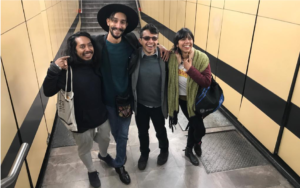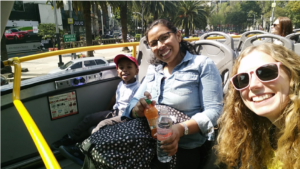I’ve decided to do this week’s blog about a research project I’m currently assisting with and to raise awareness of the career-enhancing (and fun) opportunities you can get involved with at Bath outside of your main PhD studies.
The project I’m working on is part of a wider European Union (EU) project involving four worldwide universities and 3 EU Non-Governmental Organisations (NGOs). The current activity in Mexico is led by one of my supervisors which is how I was able to get involved. The project aims to use co-creation methods as an agent for change in disadvantaged urban areas and is taking different approaches in the various case-study sites. Here in Mexico, we are working with two secondary schools (one test school and one control school) using poetry and street art.
We’ve been fortunate to partner with two fantastic organisations – Alas y Raíces (Wings & Roots), part of the Mexican government’s Ministry of Culture and Poesía y Trayecto (Poetry and Journeys) – as well as an excellent local street artist. The first part of the project involved meeting with all involved to co-create the workshops to be run with the students. Then, last week, we conducted our baseline survey with the students about themselves, their schools and their neighbourhoods, using an adapted version of the International Civic and Citizenship Education Survey (ICCS). This was then followed by poetry workshops at the test school run by the four brilliant poets we’ve been working with.
Although they only had two mornings with the students, running a range of initial confidence and team-building activities around poetry before moving onto some short writing exercises and finally onto the creation of longer poems, the poets were able to build an intimate and supportive environment for expression. The result: some incredible poems from the students some of which were deeply moving where students expressed feelings about deeply personal and painful topics including abandonment by family members and sexual harassment. Whilst this was obviously very sad, I was really moved that the students felt able to share their experiences of such topics. The support of their classmates - smiles, pats and hugs – was also very touching. It was a powerful moment to witness within the lives of these young people. Indeed, as one of the poets said to his group at the end of the final session; “poetry is a tool that you have for life now - that no-one can take away from you”.

The brilliant team of poets from Poesía y Trayecto
This week, the students at the test school will take part in two days of street art, painting a mural on a wall outside their school using imagery and words from their poems. This will then be followed by a final event to which students, teachers and parents will be invited. The event will take place in front of the mural and students will be invited to share their poems with the audience. I’m really looking forward to seeing the results of all their hard work and the reactions of those present.
Following this event, our project team will ask the students at both schools to complete the questionnaire for a second time. Once this is completed, we will also run a workshop at the control school to ensure they don’t miss out on the experience. The questionnaire results for the students at the test school will then be compared to those of the control to see whether, as we hope, the workshops have had a positive impact on students’ perceptions of themselves as actors for change within their schools and neighbourhoods.
And as for me, well it’s also been a fantastic opportunity for both my personal and professional development too. Though it’s been a bit of a baptism of fire for my Spanish(!), my confidence is building and I’m learning a lot – helped by the very patient team we’re working with. Furthermore, it’s also been a great way to develop research skills that will be important for my own PhD project. For example, the importance of getting parental consent forms to schools as soon as possible (because one way or another, it’ll always take students a while to fill out the right bits and to get them back to you), that you can’t emphasise enough the importance of selecting only one answer to a multiple choice question (otherwise you’ll end up with some data you can’t use), the best strategies for creating student identifiers with a dataset and for dealing with missing data.
I’ve also been fortunate to have some free time to explore Mexico City which (aside from the traffic) is an incredible city. Highlights for me so far have included El Templo Mayor (The Great Temple), the main temple of the Aztecs in the heart of ‘Tenochtitlan’ (now Mexico City), climbing nearby Iztaccihuatl volcano (known as the sleeping lady) and taking a bus tour in the sunshine with my PhD colleague, Eliana and her son.

Enjoying Mexico City’s ‘Turibus’ along with fellow Education PhD student, Eliana, who’s also working on the project and her son Declan.
Well, I think that’s all for now. A quick reminder that the Doctoral Christmas Party is taking place this afternoon (Wednesday 5th) from 16:00 – 18:00 in 10 West 5.07, including festive nibbles, music, drinks and a quiz – I’m sad to miss it!
Festive wishes and adios
Jo
p.s. I’ll leave you with a fun Mexican Christmas fact: the distinctive red and green poinsettias that appear in UK shops around Christmas time are actually indigenous to Mexico (they’re everywhere here) and take their English name from Joel Roberts Poinsett, the first US ambassador to Mexico, who introduced the plant to the US in 1825.
 Poinsettias in Mexico
Poinsettias in Mexico
Respond